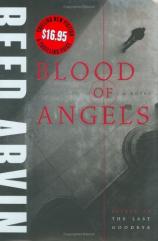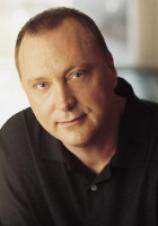Excerpt
Excerpt
Blood Of Angels

Chapter One
I am the assistant district attorney of Davidson County, Tennessee,
and on May 18, 2004, I killed Wilson Owens. He was determined, and
I was willing. We were like lovers, in that way. Wilson pursued me
with a string of petty thefts and miscellaneous criminal acts --
working his way through his lesser loves -- until he could wait for
our union no longer. On that day -- three years, two months, and
eleven days before his own death -- Owens killed Steven Davidson,
the manager of the Sunshine Grocery Store in east Nashville. The
moment Wilson's bullet entered Davidson's chest, the dance between
us began.
I mention these names because it's important in my line of work
that they are remembered. Both are dead, and both are lamented by
their families. Ironically, both have gravestones in the same
cemetery, Roselawn Memorial Gardens, in east Nashville; Wilson is
buried underneath a flat, nondescript stone inscribed only with his
name and the duration of his life. A hundred and fifty yards away,
Davidson lies beneath an ornate, marble monument paid for by his
numerous friends, fellow churchgoers, and family.
Wilson was what society calls a bad man. The truth, as usual, is
more complex. What is certain is that his life went off the rails
as a teenager, when his father -- a man to whom the notion of
family responsibility was as alien as a day without alcohol -- took
a final uppercut at his mother and walked out the door. From those
sullen seeds Wilson grew, nurtured in the subculture of the
Nashville projects, until he emerged, at eighteen years old,
already twice a father, already once a felon. His destiny was
sealed, as was mine.
I was born to kill Wilson Owens as surely as he was born to be my
victim. This is clear only in retrospect, of course. When I was
growing up in Wichita, Kansas, the son of a civilian airplane
mechanic who worked at McConnell Air Force Base, the idea that I
would one day kill a man was as distant from my mind as India. My
father's world was full of wrenches, grease, and secondhand tales
of pilot braggadocio. I loved that world nearly as much I loved my
father. In those days of blissfully low security, I would ride my
bike from home to the base, wave at the bored guards, and screech
to a halt outside the hanger 3, where my father worked. I would
watch him clamber inside one of the huge General Electric engines
hanging under the wing of a tanker, or, perched on his shoulders, I
would peer inside the still-warm tailpipe of an F-15 fighter. He
and the other workers wore flattop haircuts, black shoes, and the
gray coveralls of Faris Aircraft, the company that subcontracted
the overflow aircraft maintenance work at the base. I wore my hair
the same way, even though in the early eighties this had all the
cachet of a funeral director. It didn't matter. To identify with my
father and the easygoing men of his world was all that
mattered.
My mother lived in an entirely different world, one which I
generally viewed with suspicion. A legal secretary, she worked in
the grandly named but decrepit Century Plaza Building, an aging
structure with noisy plumbing and elevators with doors that had to
be manually pulled shut. The few times I went there -- no more than
five or six in my entire childhood -- confirmed to me that the
world of suits, ties, and paper-pushing was greatly inferior to the
vibrant, masculine world of my father. My father's coworkers were
muscular, told dirty jokes, and had eyes that sparkled when they
roughhoused. The men of my mother's world all seemed slick,
dark-haired, and smiling with secret agendas. That my mother seemed
so completely at home in this world haunted me then, and now that I
occupy the same world myself, haunts me still. To my surprise, I am
more my mother's son than my father's, although physically I am his
younger picture. I have his photograph before me now, as I sit at
my desk at the DA's office on a gray, August afternoon. He is
bare-chested, his wide-open smile pointed at the camera, a
cigarette in his left hand, ready to fix any airplane that happens
to roll by. Looking at his smile, I can almost believe he could fix
the world.
On the day he died -- having fallen thirty-eight feet from the wing
of an AC-130 Hercules onto the griddle-hot asphalt beneath the
plane, breaking his neck as cleanly as a chicken's wishbone -- the
world as I had known it ceased to exist. I spent the next year or
so trying to bring him back, which my current profession has long
since taught me is impossible. But at eighteen, the answer to my
problems seemed to involve smoking a good deal of dope, drinking
beer, and arguing with my mother over the direction of my life.
Predictably, I wanted to join the military. She wanted me to go to
college and become a lawyer. The compromise was inevitable: I
agreed to go to college if I could be in ROTC, which paid my
tuition in exchange for two years of active service. Since my
father left us little, my mother could hardly refuse. I enrolled at
Wichita State, and somewhere between marching for ROTC and an
English class I found the part of my mother inside myself that I
had denied. I was a hell of a student and a hell of a recruit. I
put the two together, traded two more years of active duty with the
Judge Advocate General's Corps for law school, and in 1992 walked
out of Vanderbilt Law a second lieutenant ready to fulfill my
commitment to the army.




